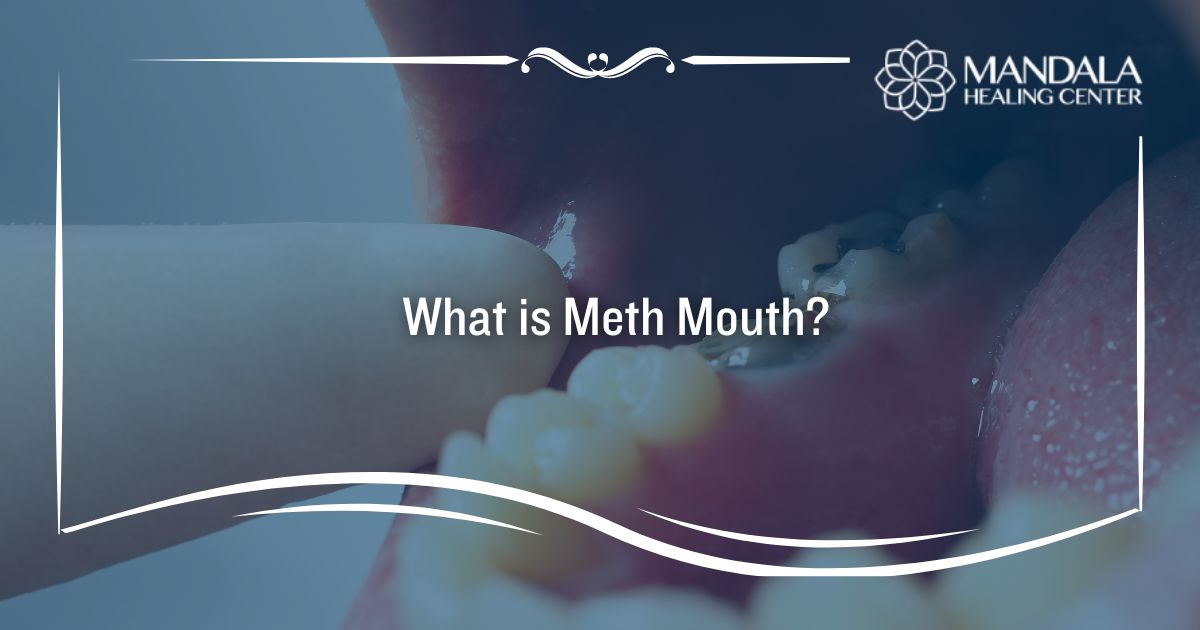Methamphetamine, commonly known as meth, is a highly addictive stimulant that increases activity in the central nervous system leading to heightened confidence, increased energy, rapid heart beat, and paranoia.[1]
While the immediate effects of meth on the brain and body are severe and often lead to addiction, one of the most visible and destructive effects of long-term meth use is a condition known as “meth mouth,” a chronic dental decay and gum disease most commonly associated with meth users.
What Causes Meth Mouth?
Several factors contribute to “meth mouth,” including the chemical makeup of the drug itself, behavioral characteristics, and diet.[2]
Chemical Composition
Meth is a synthetic drug made by combining over-the-counter prescription medications with toxic chemicals such as drain cleaner, battery acid, lye, lantern fuel, and antifreeze.[3]
It is often ingested by smoking or snorting, exposing the teeth and gums to these harsh chemicals and damaging the oral tissues. This, along with the acidic nature of the drug, contributes to tooth enamel erosion, leaving one susceptible to damage and tooth decay.
Behavioral and Lifestyle Factors
It is not uncommon for meth users to neglect oral hygiene, as the drug’s stimulating effects can keep users awake for days at a time, during which they may not brush their teeth. The lack of routine dental care heightens the decay and damage caused by the drug.
Additionally, many meth users often experience dry mouth, also known as xerostomia, which is a significant factor in the development of meth mouth. Saliva is crucial in maintaining oral health, helping to neutralize acids, wash away food particles, and provide disease-fighting substances throughout the mouth.
Meth use halts saliva production, creating a dry environment where harmful bacteria thrive and accelerate tooth decay and gum disease.[4]
Diet and Nutrition
Another contributing factor to meth mouth is the dietary habits of meth users. Meth reduces appetite, and many meth users experience malnutrition.[5] A diet lacking vital nutrients like Vitamin C or Iron may hinder the body’s ability to heal itself properly. As a result, people with meth mouth may live with painful lesions or abscesses that are unable to recover.
Signs of Meth Mouth
Meth mouth is characterized by severe tooth decay and gum disease, which often causes teeth to fall out or break. Chronic meth users may have blackened, stained, or rotting teeth due to long-term meth use. Common signs of meth mouth include:
- Gum Disease: Chronic meth use can lead to severe gum disease, including swollen or bleeding gums and eventually tooth loss as the supporting structures around the tooth become infected and damaged.
- Tooth Decay: Meth users typically suffer from severe tooth decay starting at the gum line and progressing to the entire tooth, leading to blackened, stained, and rotting teeth.
- Cracked and Broken Teeth: Enamel erosion causes teeth to become brittle and easily broken or cracked. Additionally, meth users may clench or grind their teeth, known as bruxism, which further damages their teeth over time.
- Oral Sores and Infections: Meth users often develop sores and infections in the mouth due to poor oral hygiene and the drug’s irritating effects on the oral tissues.
- Tooth Loss: Due to the combination of severe decay, gum disease, and physical damage, meth users often experience premature tooth loss.
Treatment and Recovery
Treatment for meth mouth requires a comprehensive approach, combining dental care, addiction treatment, and lifestyle changes.
Medical Detox
The first step in treating meth mouth is the halt of meth use entirely and undergoing a medical detox, as dental damage will only continue if the drug continues to be used.
Mental Health Counseling and Therapy
Addressing one’s mental health is also crucial for long-term recovery, as meth mouth can lead to significant self-esteem issues and social isolation. Meth users may feel ashamed of their appearance and avoid social interactions, which can exacerbate mental health issues such as depression and anxiety and keep one from seeking help and recovery.
Nutrition Counseling and Education
Nutritional counseling and education on proper oral hygiene practices are crucial for those struggling with meth mouth. This aftercare includes implementing a regular oral hygiene routine, such as brushing and flossing, reducing sugary food and drink intake, and maintaining routine dental check-ups.
Medical Procedures and Treatment
Common treatments for meth mouth include:
- Restorative Procedures: Fillings, crowns, or veneers help repair damaged teeth. In severe cases, extractions and dental implants or dentures may be necessary to replace lost teeth.
- Gum Disease Treatment: Scaling and root planing can help manage gum disease, while advanced cases may require surgical intervention.
- Saliva Substitutes: Products that mimic saliva can help alleviate dry mouth and protect against further decay.
Treatment at Mandala Healing Center
Meth addiction is a complex and debilitating drug addiction that requires expert help and intervention. If you or a loved one are suffering from meth addiction, it’s never too late to reach out for help.
Our team at Mandala Healing Center provides a comprehensive meth addiction treatment program, combining evidence-based practices with holistic therapies to help manage withdrawal, identify the underlying cause of their addiction, and work toward lifelong recovery.
Contact us today to learn more about how we can help you take back your life.
References:
- National Institute on Drug Abuse (NIDA): Methamphetamine
- National Institutes of Health (NIH): Understanding the Basis of METH Mouth Using a Rodent Model of Methamphetamine Injection, Sugar Consumption, and Streptococcus mutans Infection
- NIDA: How is methamphetamine manufactured?
- NIH: Sympathomimetic effects of chronic methamphetamine abuse on oral health: a cross-sectional study
- Journal of the Academy of Nutrition and Dietetics: Dietary Habits of Methamphetamine Users












